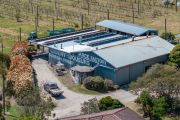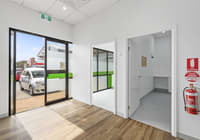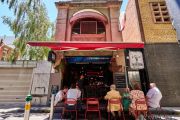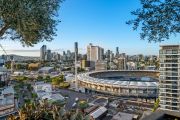
Salesforce tower deal struck as Japanese rush for real estate
Odakyu Electric Railway Co has bought a stake in Salesforce Tower, Sydney’s tallest office building, the latest example in a $6 billion wave of investment that has re-established Japanese companies as major players in Australia’s property market.
The return that has brought some of Japan’s biggest corporate names into Australian real estate, ranging from investments in premium office towers, to greenfield housing estates, CBD build-to-rent apartment blocks and construction firms.

After a decades-long retreat – following bursting of the 1980s Japanese economic bubble characterised in this country by the development of golf courses and trophy buildings – property investment is again gaining pace and scale.
“They’re creating a whole investment market that didn’t exist previously,” Ian Williams, the chairman of NEX Building Group, author of law firm Herbert Smith Freehills’ annual report on Australia-Japan investment and a former Wallaby rugby player, told The Australian Financial Review on Wednesday.
“One big investor comes in that can take the development and consent risk. Once it’s built there are plenty who are willing to take a slice because it’s derisked. It allows a number of investors to develop a portfolio in different cities, different sectors, whether office, build-to-sell or build-to-rent.”
MSCI figures show the $6 billion of Japanese investment in Australian real estate in the past two years – $3 billion last year and $3 billion in 2023 – equalled the cumulative total of the previous 22 years.
Property still remains relatively small in comparison with Japan’s long-standing investments in natural resources. Tokyo-listed trading house Mitsui in February said it would pay $8.4 billion, its biggest-ever investment, for a 40 per cent stake in Rio Tinto’s untapped Rhodes Ridge iron ore project.
But demand for investible real estate is growing. Last calendar year the asset class accounted for one in every five Japanese investment deals in Australia, HSF’s Japan-Australia Investment Report 2024 shows.

The scale of investment in recent years has been clear in deals such as Daibiru Corporation’s purchase in March of the 29-storey 135 King Street office tower in Sydney for more than $600 million – the biggest office deal this year to date.
Last year Mitsui Fudosan agreed to pay $1.3 billion for a two-thirds stake in Mirvac’s planned 55 Pitt Street office tower in Sydney, and Sumitomo Forestry paid $115 million for a majority stake in Metricon, the country’s biggest home-builder.
ASX-listed developer and investor Stockland in 2022 formed a partnership with Mitsubishi Estate Asia to own and develop land lease communities providing affordably priced housing to downsizing over-55s.
Lendlease has investment partnerships in Australia with Daiwa House at its $650 million, 797-unit Melbourne Quarter West build-to-rent tower and it agreed to jointly develop the two-tower $3 billion One Circular Quay project in Sydney with Mitsubishi Estate.
Mitsubishi Estate is the third investor in Mirvac’s $1.8 billion build-to-rent fund alongside the federal government’s Clean Energy Finance Corporation and Daibiru is an equal investor with Mirvac in its 21-level, 7 Spencer Street office tower project in Melbourne’s Northbank precinct.
Mitsui Fudosan in 2022 made an undisclosed investment into Frasers Property’s $232 million MAC Residences project in Sydney’s Macquarie Park.
But the Salesforce Tower deal illustrates just how much more Japanese capital is lining up, as the biggest Japanese institutions lay a path for smaller peers, such Odakyu, to follow.
“We’d like to invest around $50 million every year from now,” Odakyu Australia director Kanji Ochiai told the Financial Review on Wednesday. “That number is not big compared to other investors, but our strategy is gradually expanding and seeking the opportunity continuously every year.”

Odakyu Australia bought into a new fund created last month when Mitsubishi Estate sold down part of its 30 per cent stake in the Lendlease-developed Salesforce Tower at Circular Quay, chalking up a third investment in this country for Odakyu.
Ochiai, who declined to comment on the size of the stake or what Odakyu paid for it, said the deal brought total capital deployment by the railway company’s property arm to “nearly $100 million”.
The company also has a stake in Sydney’s 60 Margaret Street mixed-use office complex as well as a minority interest in Daiwa House’s The Hills of Carmel, a 1600-lot land subdivision over 89 hectares in north-western Sydney’s Hills Shire.
While the slump in office values following COVID-19 pandemic restrictions and adoption of working from home practices has created opportunities for investors to buy in to the structurally challenged sector, Ochiai said with two office stakes already, Odakyu was looking at other asset classes.
“We haven’t decided yet what is next,” he said, stressing the $50 million target was an indicative number and could vary. “It’s flexible, but personally I would like to diversify.”
Pricing for the deal around the Salesforce Tower, once valued at about $2 billion, would have given a key indicator into the value of premium Sydney office property. Mitsubishi Estate Asia director Yosuke Matsunaga said he could not comment on the deal.
Lendlease, which developed the tower, retains a 20 per cent stake through its $5.7 billion Australian Prime Property Fund Commercial.
“Having Japanese partners alongside us, what we’ve seen is investments start conservatively and increase over time, based on the success of the investment and as more confidence and exposure is gained in the local market,” Lendlease chief executive Tony Lombardo said.











